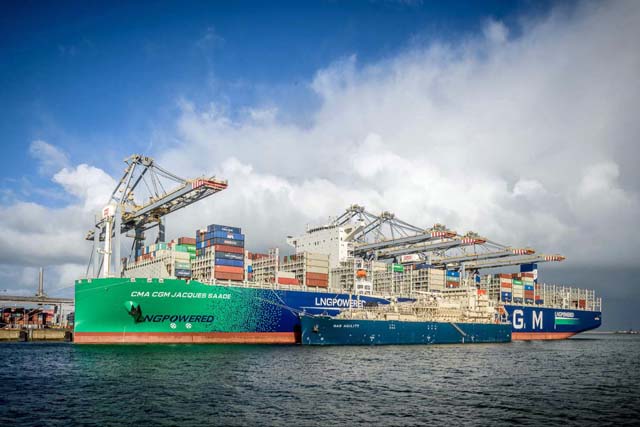The CMA CGM Group has announced a Special Fund for Energies, backed by a five-year, US$ 1.5bn budget, to accelerate its energy transition and achieve net-zero carbon by 2050.
The Fund will invest to support the industrial production of new fuels, as well as low-emission mobility solutions across the Group’s business base, and help to support a global innovation platform.
Rodolphe Saadé, Chairman and CEO, CMA CGM Group, said: “The CMA CGM Group has been acting to protect the environment for many years. It is at the heart of my convictions and of our strategy. However, in the face of the climate emergency it is our duty to do more and accelerate our actions. This fund will enable us to make substantial investments in innovative projects to decarbonize our business. We have allocated the resources needed to accelerate our energy transition and that of the entire shipping and logistics industry.”
The Special Fund for Energies will invest in innovative projects to secure the supply of renewable energies and explore new solutions and prototypes to meet the ambitious decarbonisation targets being pursued across the CMA CGM organisation. The CMA CGM Group has already begun to respond to climate change by using liquefied natural gas (LNG) as a transitional maritime fuel.
The Fund has been tasked with:
- driving forward the emergence of industrial-scale production facilities for biofuels, biomethane, e-methane, carbon-free methanol, and other alternative fuels, and
- increasing and securing volumes in line with Group needs, in partnership with other major industrial groups with expertise in these technologies, or with investment funds or promising start-ups.
The Fund follows on from projects that have already been identified and launched, such as the Salamander Project which will produce 11,000t of second-generation biomethane per year starting in 2026. As part of the partnership with Engie, its target is to generate 200,000 tonnes of renewable gas per year by 2028, to serve the needs of CMA CGM and the entire shipping industry. A biomethane production and liquefaction project, developed with Titan, will produce up to 100,000t by 2025, with the possibility of doubling output by 2027.
As a partner in the Jupiter 1000 project in Fos, the CMA CGM Group aims to continue working with the consortium on means to mass-produce low-carbon e-methane for its ships and provide solutions to the challenges of decarbonising gas networks and managing the intermittent nature of certain renewables.
The second focus will concentrate on accelerating the decarbonisation of port operations, while a third focus will be to support, trial and launch projects at the cutting edge of innovation, such as a joint venture with Energy Observer to make hydrogen one of the energy sources of tomorrow.
With the Energy Observer 2 project, the partners have taken a step forward by working together on a prototype intra-regional container ship fuelled by liquid hydrogen. The project is focused on developing practical applications for this new technology, to enable carbon-free maritime shipping on a larger scale, in particular for short distances.
The Group has also decided to acquire a stake in Neoline, a prototype sail-powered cargo ship set to serve transatlantic routes by the end of 2024. It is also supporting SeaOrbiter, a prototype marine research vessel and floating oceanographic laboratory designed by French architect Jacques Rougerie that is exploring pathways to the emerging blue economy.
The CMA CGM Group’s R&D team will continue to optimise the design and propulsion of large container ships to reduce their fuel use, while developing increasingly effective solutions to help the Group become more energy efficient.
A fourth focus will be on pursuing energy savings and improving the energy efficiency of CMA CGM working methods and daily mobility.
The Fund will be backed by a US$ 1.5bn budget and managed, starting in October 2022, by a dedicated team bringing together some of the Group’s most talented engineers, energy experts, financial analysts and project managers.



